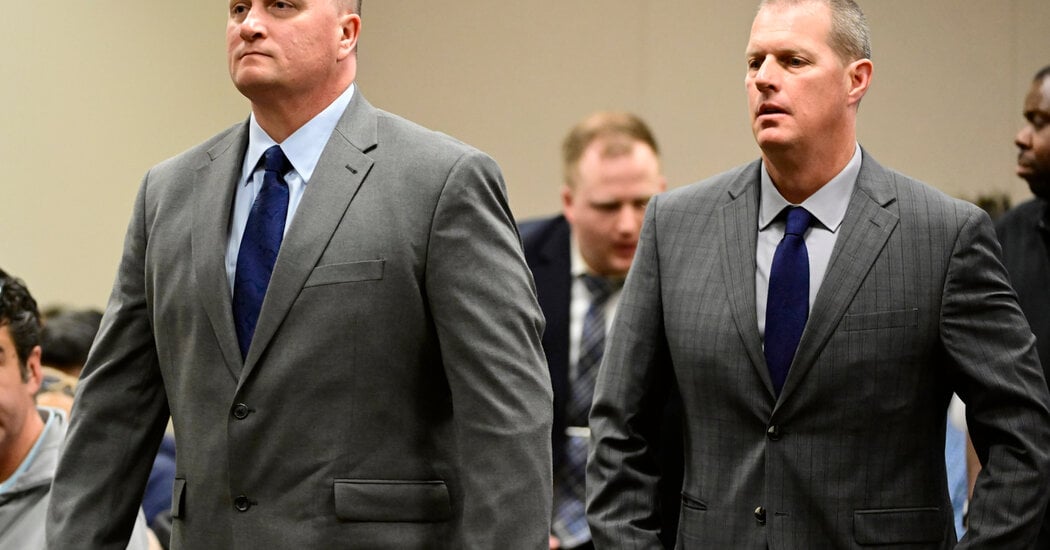Two Colorado paramedics were convicted of criminally negligent homicide in the 2019 death of Elijah McClain, a young unarmed Black man whose case drew national attention and forced public safety reforms in the city where he lived and died.
A mostly white jury found the paramedics, Peter Cichuniec and Jeremy Cooper, guilty of a more serious charge they faced. But the jury split on two lesser assault charges: They cleared Mr. Cooper of both assault charges, but convicted Mr. Cichuniec of one of those charges, second-degree assault for the unlawful administration of drugs.
The men had injected Mr. McClain with the powerful sedative ketamine while he was in police custody in Aurora, Colo., which doctors said left him near death. He died days later in the hospital.
The trial was a rare prosecution of paramedics, and raised the question of the role that medical personnel play in police encounters and whether they could be held criminally responsible for their actions.



Few flaws in your argument. Let’s set some egos aside and discuss this intelligently as healthcare providers.
I need to call you on this, because it calls close to the desire of some people in EMS to refer to other citizens as civilians. It’s easier for us, yes, and there can be a definite need to sedate some patients. But sedation should be based on the patient’s needs and ability to be safely sedated, not based on our comfort. I’m being really persnickety here, because I’ve seen a strong increase in the “us vs. them” mentality in EMS over the years. I don’t like it, and it’s not healthy.
You and I can both get weight right to about 5kg with any reasonable field experience. This was a bad dosing and saying “we aren’t perfect” when the dose is 40% off is dangerous. I’ve never been a fan of ketamine, but I know versed can have shortages and sometimes we play drug-of-the-week to fix that.
They did change, they removed ketamine from the units.
I feel like you’re trying to appeal to your authority here to say these are the only two options. Having transported the self purported devil at least twice (not the same dude the second time, but both apparently will here for my soul at some point), there are intermittent steps including restraint or our old friend the backboard to keep people from doing harm to themselves or others. This patient has been restrained and made unconscious by law enforcement. A horrible thing happened, and these guys did a 100kg dose on a paperweight kid and he died.
Arm chairing this call by either of us won’t fix the problem nor bring the patient back. But I wanted to clarify these points, as you have experience beyond most people in the thread. Stay safe out there and I hope you get some sleep. :)
Ego is set aside, for the discussion. I am here to discuss this intelligently like you requested. So to clarify, we don’t know the situations we are walking into and only have a few minutes to make decisions.
Why I said this is the guy was fighting with law enforcement and throwing up. This doesn’t have to be his fault but how are we to determine this isn’t a brain bleed? (I don’t remember where I read it but) Mix in him potentially going in and out of consciousness and it would be irresponsible to not intervene, any excess stimulation will make a brain bleed worse.
I don’t have any authority and I have no desire to hold any authority, nor do I conform to the us vs them mentality, however law enforcement isn’t shy about slamming heads onto the ground. As with my previous statement, if they slammed his head into the ground and kept fighting, then he may not have started with a brain bleed but may have developed one.
Also in the context of dosing, another comment says he is 140lbs or 63.6 kg. If dosing is 5mg/kg the dose would be 318mg. The other comment says 320-350mg. Sure if I round to 64kg I’d get 320mg but we are talking about this situation with nothing but time. Although I will give you that 500mg was a bit extreme of an estimation.
I don’t think this is in the best interests of the patients that the agency serves and I hope it isn’t a reactionary decision to shift liability away from doing adequate training in the r department. I think it would have been more appropriate to re-evaluate the protocols and maybe do some retraining or just limit it to airway management or online medical control orders only.
Also I appreciate the discussion, I’m not trying to arm chair this call. I am actively avoiding commenting on whether I think they did things appropriately or not because I don’t have the information I need to determine that. I don’t jump on the blame train without knowing more. I can think that there isn’t a reasonable situation that I can think of to justify this, but I don’t want to jump to blaming anyone without all the information.
I agree a horrible thing happened and discussion will not bring the patient back. Whole we might not be able to bring the patient back but we should learn from the situation to prevent it from happening again.